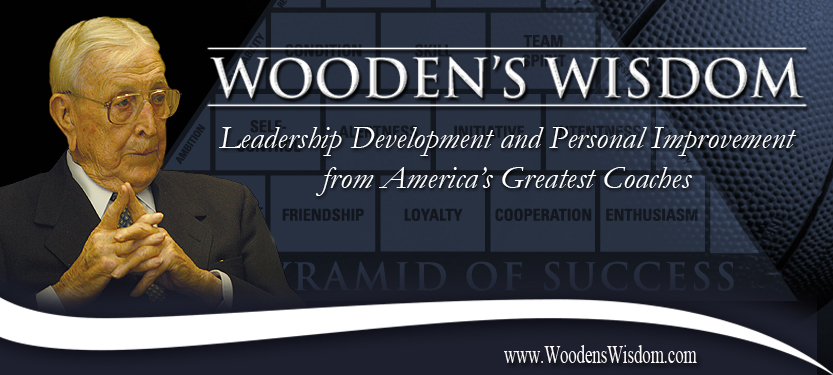 |
|
| Wooden's Wisdom - Volume 10 | Issue 429 |
| Craig Impelman Speaking | Championship Coaches | Champion's Leadership Library Login | |
|
"CHAMPIONSHIP DISCIPLINE" (SUZANNE YOCULAN PART FIVE) Legendary Georgia Women's Gymnastics coach Suzanne Yoculan and Coach Wooden both won 10 NCAA championships. They had much in common in their approach to discipline.
Coach Wooden liked to say: "Discipline yourself and others won't need to." In her book, Perfect 10 with Bill Donaldson, Coach Yoculan described her approach:
"Self-discipline to tenaciously pursue one's full potential is the most important success factor in athletic and other accomplishments. I like to think that the word "self" is an understood modifier of discipline, because if someone else is controlling your activities, you're not exercising discipline, you're merely following instructions."
Success depends on an individual's discipline to perform arduous activities on his or her own initiative. Coach Wooden had only three rules and several expectations. Coach Yoculan discussed how she used guidelines:
"If you can define objectives without directing team members, in detail, how to achieve those objectives, they are likely to come up with better approaches than the ones you might devise. So, I much prefer general guidelines to hard and fast rules, but the guidelines must have well-understood boundaries. And a gymnast must understand that if she goes beyond those boundaries, there will be appropriate adverse consequences.
I emphasize "using good judgement," and when I say a gymnast uses good judgement it means that I am happy with the decision she makes. The gymnasts must do some analysis to determine for themselves what constitutes good judgement. And, after all, that's what they'll have to do when they're out on their own."
Coach Wooden often said: "The purpose of discipline is to teach, not to punish." Coach Yoculan put it this way:
"Corrective action must be carefully thought out before it is implemented. It must have a positive result. It should not reflect a coach's anger, even though we all get angry with athletes at times. You must be predictable, consistent, and direct. Don't play games. Don't be sarcastic.
It is essential that an athlete undergoing corrective action — you notice I don't say "being disciplined" - understands that she was told of the guidelines or rules she violated before she violated them. She must know, given the same circumstances, that anyone else with a similar past record would receive the same treatment. The treatment must not be embarrassing or demeaning, and the objective of improvement must be clearly appreciated by the one undergoing the action and the other team members. I work to make every aspect of our program positive.
Making athletes feel that discipline is positive isn't easy, But it can and should be done. When discipline truly achieves its goal, the athlete feels good about it, you feel good about it, the other coaches feel good about it, and the teammates feel good about it."
What results do you get when you take corrective action?
Yours in Coaching, Craig Impelman
|
As It Is I might wish the world were better, Edgar Allen Guest (1881-1959)
|
|
For more information visit www.woodenswisdom.com |
|
© Copyright 2026 WoodensWisdom.com | # of Times Wooden's Wisdom Issues Opened: 7,859,805
Hosting & Design by:EverydayWebDesign.com